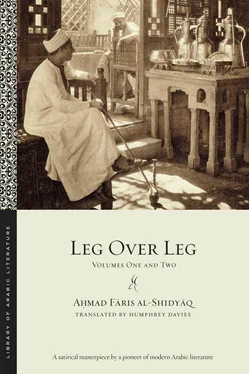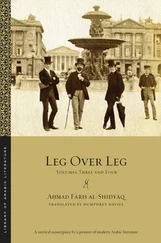1.2.7
Both usages contain a certain incomprehensibility and ambiguity. The incomprehensibility of the use of “horn” by non-Jewish writers as a metonym for women’s infidelity to their husbands lies in the fact that the shape of the horn does not bring to mind any specific human member and neither do its actual manifestations bring to mind any specific animal, for the ox, the mountain goat, the billy goat, and the rhinoceros all have one. Similarly, the word itself is not derived from any verb that might indicate a woman’s being unfaithful or taking a lover. 129What, then, lies behind this usage? I have asked many married men of lengthy experience about this prickly issue, and all of them changed color on hearing my question and, embarrassed and despondent, stammered, got up, and left me. Should God, then, grant any of those who peruse this book of mine a sudden insight as to the meaning of this word, both in common usage and as a technical term, let him be so good as to respond, out of kindness and charity. As to its usage among the writers of the Jews as a metonym for high rank, power, strength, and victory, what is true of the preceding is true of that too, namely, that it is common to many animals, some of which are possessed of neither power nor might. Observe, then, how people differ with regard to a single word and a single meaning!
1.2.8
As for “turban” ( ʿimāma ), I believe it derives from ʿamma meaning “to embrace,” for it embraces the head. It comes in various forms, among them the spiral, the cake-shaped, the wheel-shaped, the globular, the coil-shaped, the conical, the basket-shaped, and the cup-shaped, and all of these, whatever the type, are better than the baptismal fonts that the Maronite religious leaders wear. Let them just take a look at their faces in a well-polished mirror!
CHAPTER 3. VARIOUS AMUSING ANECDOTES
1.3.1
From childhood, the Fāriyāq had felt an instinctive disposition to read and assiduously study the classical language, picking out the rare words that he came across in books, of which his father had amassed a large number in a variety of disciplines. He, that is, the Fāriyāq, was also, from his youth, wild about poetry, even before he had learned anything about the requirements of that craft; thus sometimes he would hit the mark and other times miss it. He also believed poets were the best people and poetry the most magnificent thing with which a man could occupy himself.
1.3.2
Then one day he read in some chronicle of a poet who in his youth had been stupid and artless but had grown up to excel and to shine at composing lengthy odes. The story is told of him that one day he got drunk and sat down beside a monk’s cell(1) 130from whence he set about delivering the sermon of Abū l-ʿIbar Ṭarad Ṭabak Ṭalandī Bak Nak Yak 131from the drain. 132Also that one day, he wanted to scale a wall so that he could reach some dates, and he fell into an animal trap set by the owner of the orchard. 133And that one day he told his mother that such and such a woman had an excellent maid who had “washed the door of her house today till it was shining black.” And that one day he caught sight of a boy who had had one of his molars removed, so he went and borrowed a dirham and told the cupper, “Take my molar out too because it doesn’t cut my food; maybe another, sharper, molar will grow in its place.”
1.3.3
And one day someone said to him, “Many stories have been recorded of your stupidity,” to which he replied, “I wish someone would read them to me so I could have a laugh!” And one day his brother fell ill and his father said to his wife, “The food he ate yesterday was bad for him,” and the poet said, “Yes, the food was bad for him and so was the maid.” “What has the maid got to do with it?” his father asked him, and he said, “Maybe she gave him something he didn’t like.” And his mother noticed blood on his clothes and asked him, “What’s that blood?” and he answered, “I fell over and my blood ran, which is for the good, for it is said, ‘If someone falls over and his blood runs, he gets well and is strengthened.’” And he cut his hand with a knife and threw it away, saying, “This knife is worthless”; his father said to him, “If it really were, it wouldn’t have cut your hand,” to which the man replied, “Everyone in the world cuts his hand, if not with a knife then with something else.”
1.3.4
And he said, “Once I saw cheese as white as tar in the market.” And someone said to him, “Why don’t you wash your hands?” He replied, “I do, but they get dirty again straight away; I can’t get them clean because my blood is dirty.” And one day he saw some men who had been crucified and he asked his mother, “Mother, if those men survive, can those who crucified them re-crucify them?” And a company of people once asked after someone’s house and he said, “I know where it is located.” “How do you know?” he was asked and he replied, “I saw the man going through the market on foot.” And one day he said, “Time moves faster between eight and nine than between six and seven.” And someone asked him, “Which do you like better, meat or fish?” and he replied, “Really, I think I like this one better.” 134
1.3.5
And his father said to him, “If you were away from us, would you be able to write us a letter?” and he replied, “Yes. I’d write it and bring it to you, too.” And he heard his father singing the praises of some silk-wool he’d bought and with which he was delighted, so the man said, “It would have been a fortunate hour if you hadn’t bought it.” And he saw his father writing a letter and said to him, “Father, can you read what you write?” and the father replied, “How could I not when I am the one who wrote it?” “For my part,” the man said, “I cannot.” And he saw that his father was upset over a bird he had lost and told him, “God bless the hour in which it flew away!” so his father said to him, “You imbecile, I’m upset at its loss.” “So why didn’t you build it a house?” responded the man. “Can one build a house for a bird?” asked the father. “All I mean,” said the man “is two sticks going from here to there.”
1.3.6
And once he described some animals he’d seen, saying, “They included a pig that was larger than me.” And he complained of a pain in his foot and said, “I wish this foot would rot away.” And his father was explaining to him the meaning of “to save” and said to him, “If someone fell into the fire, for example, and you went and pulled him out, that would be saving him,” to which the man replied, “But he would have burned up, so how could I save him? Suppose I stuck this skewer into the fire and pulled him out with it, would that be saving?” And once another was explaining to him the meaning of “to reproach” and said to him, “If someone was slow in doing something for you and you said to him, ‘Why were you so slow? Why were you so slothful?’ that would be reproaching,” and the man said, “And I’d tell him too, ‘Why did you grow large? Why did you grow small? Why did you grow short?’” 135
1.3.7
And his mother reproached him for snorting when he spoke, and he replied, “You should reproach not me but my breath.” And his father wanted to go out one day when it was raining but decided against it because of the rain, so he said to his mother, “Mother, it’s a blessing from God that we didn’t go out today, for the weather was fine.” And his mother bought him a length of cloth and when she had had it made up he said to her, “Will the color of this cloth fade?” “I don’t know,” she replied. “I hope that it does,” he said, “because it might look better.” And once in the winter, when he was wearing only a shift, his mother said to him, “Wear your robe over your shift!” and he told her, “No. It’ll make me colder.”
Читать дальше












